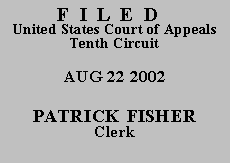

| ELIOT PAUL GOULD, | No. 02-1162
(D.C. No. 00-N-461) |
In April 2000, Mr. Gould left Colorado and traveled to New Mexico, where, on April 18, 2000, New Mexico officials arrested and subsequently arraigned him on the twenty-eight count indictment. Upon learning that Mr. Gould had been arrested and arraigned in New Mexico, Colorado dismissed its fugitive extradition case against Mr. Gould.
Approximately six weeks before his arrest and arraignment in New Mexico, Mr. Gould filed a "Petition for the Intervention of the United States District Court" with the United States District Court for the District of Colorado. (Id., Doc. 2.) On April 18, 2000, the very day Mr. Gould was arrested in New Mexico, a federal magistrate judge entered an order characterizing Mr. Gould's motion as a petition for a writ of habeas corpus filed pursuant to 28 U.S.C. § 2241.(1) (Mag. R. & R. at 1.) Mr. Gould subsequently filed an amended complaint (R.O.A., Doc. 10), and the district court ordered the Respondents-Appellees, the states of Colorado and New Mexico, to show cause why a writ of habeas corpus should not issue. (Id., Doc. 11.) Colorado and New Mexico responded by asserting that, for various reasons, Mr. Gould's petition should be dismissed for lack of subject matter jurisdiction. (Id., Docs. 19 & 20.) Mr. Gould then filed a response to the motions to dismiss, and the district court referred the petition to a federal magistrate judge. In his filings with the district court, Mr. Gould raised numerous challenges to the indictment, alleging, among other things, that he could not possibly have committed the crimes charged in the indictment and that the procedures used by the grand jury ran afoul of a recent New Mexico Supreme Court decision. Mr. Gould also argued that Colorado's extradition procedures violated his due process rights.
In his report and recommendation, the magistrate judge concluded that Mr. Gould's challenges to the New Mexico indictment and Colorado's extradition procedures should be dismissed. The magistrate judge reasoned that Mr. Gould's claims concerning Colorado's extradition proceedings were moot, given that the state had dismissed the extradition complaint. (Mag. R. & R. at 5.) As to Mr. Gould's attacks on the New Mexico indictment, the magistrate judge held that "allegations concerning the criminal indictment should be raised in New Mexico rather than in [federal court]." (Id. at 5-6.) Even assuming jurisdiction, the magistrate judge found that Mr. Gould had "not satisfied the stringent criteria required to justify the extraordinary action of federal court intervention in pending state criminal proceedings." (Id. at 6 (citing Phelps v. Hamilton, 59 F.3d 1058, 1063-64 (10th Cir. 1994).)
The district court, over Mr. Gould's objections, adopted the magistrate judge's report and recommendation. (R.O.A., Doc. 35.) Mr. Gould then filed a notice of appeal. (Id. at 37.) Because Mr. Gould is challenging his detention by state authorities, he must obtain a certificate of appealability (COA) before we may consider the merits of his appeal. Montez v. McKinna, 208 F.3d 862, 867 (10th Cir. 2000). A COA is appropriate only where "the applicant has made a substantial showing of the denial of a constitutional right." 28 U.S.C. § 2253(c)(2). The district did not grant Mr. Gould a COA; accordingly, we construe his notice of appeal as a COA application. See Fed. R. App. P. 22(b).
After carefully reviewing the record, we believe, substantially for the reasons identified in the magistrate judge's report and recommendation and the district court's order, that Mr. Gould is not entitled to a COA. Therefore, we DENY Mr. Gould's COA application and DISMISS this appeal(2).
ENTERED FOR THE COURT
David M. Ebel
Circuit Judge
*.After examining appellant's brief and the appellate record, this panel has determined unanimously that oral argument would not materially assist the determination of this appeal. See Fed. R. App. P. 34(a)(2) and 10th Cir. R. 34.1(G). The case is therefore ordered submitted without oral argument. This Order and Judgment is not binding precedent, except under the doctrines of law of the case, res judicata, and collateral estoppel. The court generally disfavors the citation of orders and judgments; nevertheless, an order and judgment may be cited under the terms and conditions of 10th Cir. R. 36.3.
1.As best we discern from the filings before us, Mr. Gould does not dispute the district court's decision to characterize his motion as a habeas petition filed under § 2241. Our review of the record indicates that the district court acted properly. See Jacobs v. McCaughtry, 251 F.3d 596, 597 (7th Cir. 2001) (explaining that a state court defendant held pursuant to a state court judgment should file a habeas petition under 28 U.S.C. § 2254, but that a state court defendant attacking his pretrial detention should bring a habeas petition under 28 U.S.C. § 2241); Stringer v. Williams, 161 F.3d 259, 262 (5th Cir. 2000) (same); see also Montez v. McKinna, 208 F.3d 862, 865, 870-71 (10th Cir. 2000); (McKay, J., dissenting) (explaining that a state petitioner may use § 2241 to challenge his pretrial detention).
2.The appellant's motion to file a supplemental brief is granted.